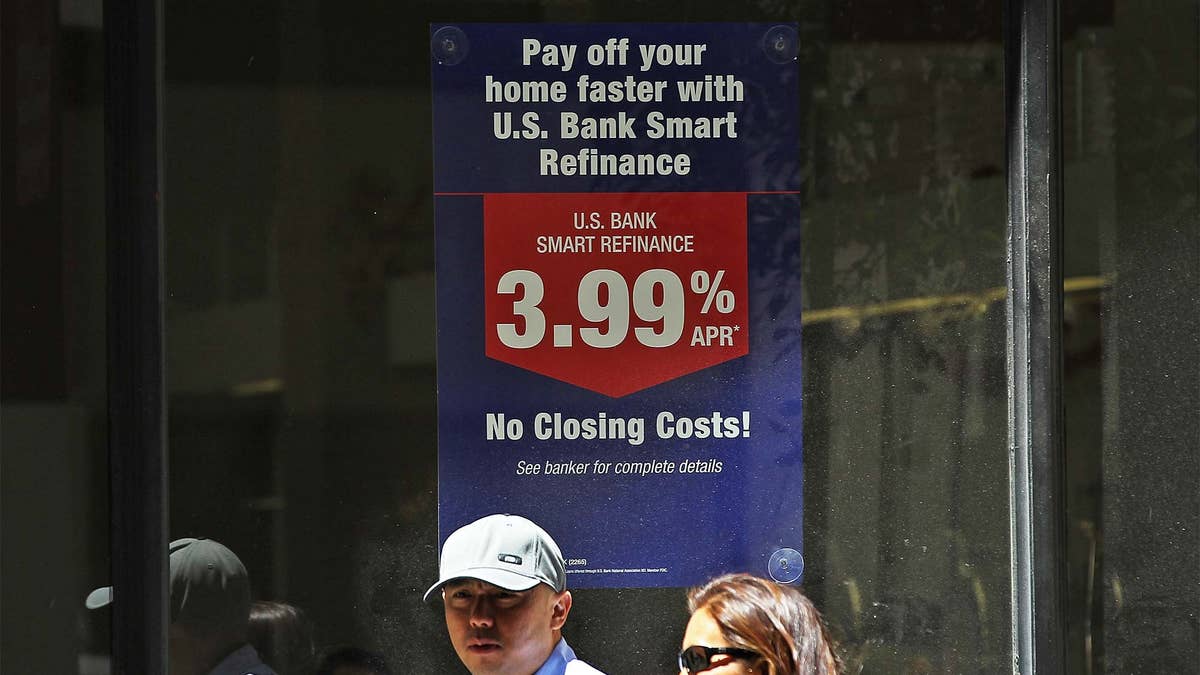
mortgage refinance sign in bank window (2012 Getty Images)
You've heard that interest rates on home loans are still at record lows, which might have you wondering: Should I refinance? After all, conventional wisdom tells us that you should refinance your mortgage when interest rates plunge -- but it turns out that's not always true.
The decision hinges on your personal financial situation and other factors. So, before you pounce on the opportunity to refinance, take a step back. Here are five signs that now would be the right time for you.
1. Your mortgage rate is at least 1% over current rates
One rule of thumb says that if your interest rate is more than 100 basis points (or 1%) above current rates, it makes sense to refinance. This logic would apply to a large number of today's homeowners, because current rates hover around 3.5%, yet roughly 38% of active home loans have interest rates above 4.5%, according to a report released earlier this year by CoreLogic. If it's been several years (or more than several) since you took out a loan or refinanced, your interest rate could very well be above that threshold.
The payoff can be substantial. For instance, if you took out a loan in 2011 for $300,000 with a 30-year fixed-rate interest of 4.5% and refinanced at the current rate of 3.5%, you'd cut your mortgage payments by $292 per month, saving a total of $10,266 over the life of the loan. You can use realtor.com's refinance calculator to crunch the numbers of your own mortgage and see how much you'd save.
2. You're paying mortgage insurance
If you didn't have enough cash to make a 20% down payment when you purchased your home, you're likely paying mortgage insurance -- a monthly premium that typically costs between 0.3% and 1.15% of your home loan. Refinancing to a loan without mortgage insurance can save you hundreds of dollars each month. The catch? You need to have at least 20% equity in your home to qualify.
But time is on your side right now: Home values are continuing to climb, with the median existing single-family home price increasing in 148 of the 178 cities measured by the National Association of Realtors' latest Metropolitan Median Area Prices and Affordability quarterly study.
That's good news for homeowners who are looking to refinance in order to get out of a loan with mortgage insurance, says Richard Redmond, mortgage broker at All California Mortgage in Larkspur and author of "Mortgages: The Insider's Guide."
The reason: As home values rise, so does the equity in your home (calculated as the difference between the current value of a home minus the outstanding mortgage balance). So if your home has appreciated significantly, this could push your home equity over that magic 20% mark, which would allow you to ditch your insurance. (One exception: If you have a Federal Housing Administration loan, mortgage insurance premiums will last the lifetime of the loan regardless of whether you refinance.)
3. You're planning to stay in your home for a while
How much longer you plan to stay in your home plays a big factor in determining whether it makes financial sense for you to refinance. The reason: Refinancing costs money. If you're refinancing a 30-year fixed mortgage, your closing costs will likely run 3% to 6% of your loan amount. As a result, you need to stick around long enough to recoup that money with your lower interest rate.
But for how long?
As a general rule, you ought to be able to break even within three years, says Todd Sheinin, mortgage lender and chief operating officer at New America Financial in Gaithersburg, MD. But this depends largely on your circumstances, so be sure to calculate your own break-even point with your lender.
One alternative: You could opt to do a no-cost refinance, where the lender covers the closing fees. However, doing so means you'll be paying a slightly higher interest rate, so you'll want to crunch the numbers here as well to see what makes sense.
4. You want to shorten the life of your loan
The average home buyer gets a 30-year fixed-rate mortgage. However, if you can afford to go from a 30-year to a 15-year loan, refinancing could enable you to nab a substantially lower interest rate. Granted, your monthly payment will increase, but you'll save money over the long haul. Again, you need to factor in your time frame when making this decision; however, if you're earning more than what you were when you took out your mortgage, it's worth looking into restructuring your home loan by refinancing.
5. You need a cash-out refi
With cash-out refinancing, you take out a new mortgage for more than how much you owe on your current loan -- then pocket the difference. Because mortgage lenders allow you to spend the cash however you see fit, you should have a good reason for why you need the money. For instance, using the money to pay off high-interest credit card debt is a valid use of this money, as is financing a home improvement project that's going to significantly increase your home's resale value down the road. Bad reasons to refi include recreational splurges on vacations or a new boat (but you knew that, right?).